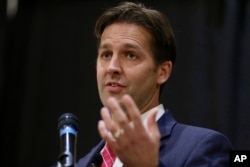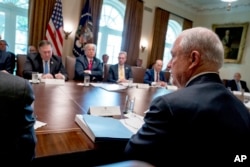Republican lawmakers are joining opposition Democrats in criticizing President Donald Trump for remarks that many are interpreting as an assault on the country’s judicial independence.
The president criticized his attorney general earlier this week over charges his Justice Department brought against two Republican congressmen. New York Rep. Chris Collins was charged as part of an alleged insider-trading scheme. California Rep. Duncan Hunter is accused of misusing campaign funds. Both have pleaded not guilty.
The president has long criticized his attorney general and the Justice Department over the ongoing probe into Russian election meddling by special counsel Robert Mueller. But the president’s latest remarks have been denounced by legal experts and members of his own party for appearing to put political concerns ahead of criminal law.
A spokesperson for House Speaker Paul Ryan told CNN that the Justice Department “should always remain apolitical, and the speaker has demonstrated he takes these charges [against Collins and Hunter] seriously.”
Sen. Ben Sasse of Nebraska released a statement saying, “The United States is not some banana republic with a two-tiered system of justice -- one for the majority party and one for the minority party.”
Sen. Jeff Flake of Arizona tweeted that Trump was “looking to use the Department of Justice to settle political scores."
Democrats also expressed alarm over the president’s remarks.
"Our justice system is under attack," Sen. Richard Blumenthal, a Connecticut Democrat, said on Tuesday.
Sen. Dick Durbin, the second-ranking Democrat in the Senate, called Trump's actions "unprecedented in American history." Durbin said Trump, by his tweets, “has virtually no respect for the rule of law.”
The U.S. justice system is politically influenced, in that the president appoints some top Justice Department officials as well as chief prosecutors in districts across the United States. But those individuals are expected to follow the law – not politics – when conducting their jobs.
Political interference?
Trump’s denunciation of Sessions “crosses a well-established line,” said Nancy V. Baker, emeritus professor of government at New Mexico State University and author of “Conflicting Loyalties: Law and Politics in the Attorney General's Office.”
Baker said even if Trump’s criticisms and remarks do not affect the Justice Department’s prosecution of the congressmen, the president “severely damages the administration of justice” every time he makes a threatening remark.
“Public perceptions are important,” Baker said. Trump’s comments make it clear that he sees his office as “above the law, which directly undermines the ancient principle of rule of law, that the law applies without fear or favor, and no one is above it," she added.
In an interview with The New York Times in 2017, Trump was asked if he would reopen the investigation into former Democratic presidential nominee Hillary Clinton’s use of a private email server during her time as secretary of State. Trump replied, "I have absolute right to do what I want to do with the Justice Department."
However legal experts say that precedents established since the Watergate scandal, which led to the resignation of President Richard Nixon in 1974, call for presidents to strictly limit communications with the department and not interfere in ongoing cases.



